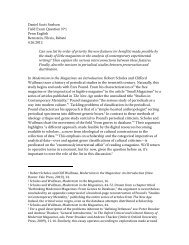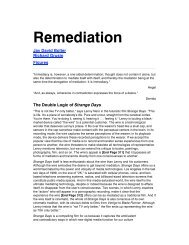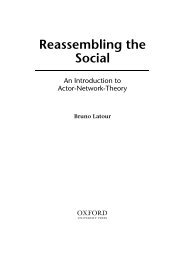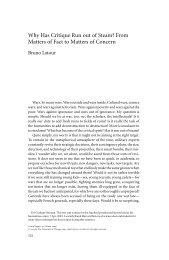The Exploit: A Theory of Networks - asounder
The Exploit: A Theory of Networks - asounder
The Exploit: A Theory of Networks - asounder
Create successful ePaper yourself
Turn your PDF publications into a flip-book with our unique Google optimized e-Paper software.
96 Nodes<br />
species borders, international borders, and the borders <strong>of</strong> ethnicity<br />
and culture.<br />
We should reiterate that protocological exploits (computer viruses, emerging<br />
infectious diseases, and so on) are politically ambivalent in their position<br />
within and among networks.<br />
While computer worms piggyback on the global standards <strong>of</strong> TCP/<br />
IP and other Internet protocols, emerging infectious diseases operate<br />
on the protocols <strong>of</strong> biological control, gene expression, and cellular<br />
metabolism.<br />
Viruses and diseases are obviously not to be looked at as models for progressive<br />
political action. But it is precisely in their ambivalent politics that<br />
we see both the plasticity and the fragility <strong>of</strong> control in networks.<br />
<strong>The</strong>re are as many lessons to be learned from the “failures” <strong>of</strong> networks<br />
as there are from their successes. Perhaps we can note that a<br />
network fails only when it works too well, when it provides too little<br />
room for change within its grand robustness, as the example <strong>of</strong> the<br />
computer virus illustrates.<br />
In this way, networks fail only when they succeed. <strong>Networks</strong> cultivate<br />
the flood, but the flood is what can take down the network.<br />
<strong>The</strong>re are several lessons to be learned from the ambivalent, nonhuman<br />
examples <strong>of</strong> computer viruses, emerging infectious diseases,<br />
and bioterrorism. To begin with, action and agency (at both the ontological<br />
and the political level) will have to be rethought in the<br />
context <strong>of</strong> networks and protocological control. This in turn means<br />
reconsidering the relationship between causality and accountability.<br />
A single person may be legally accountable for setting loose a computer<br />
virus or biological agent, but it is a more complicated manner<br />
when one person is accused <strong>of</strong> all the downstream and indirect consequences<br />
<strong>of</strong> that original action. While the legal system may be good<br />
at accountability issues, it is less adept at handling what happens after<br />
the original event. Most <strong>of</strong>ten, the response is simply to shut down or<br />
blockade the network (quarantine, firewalls). Because network ef-









